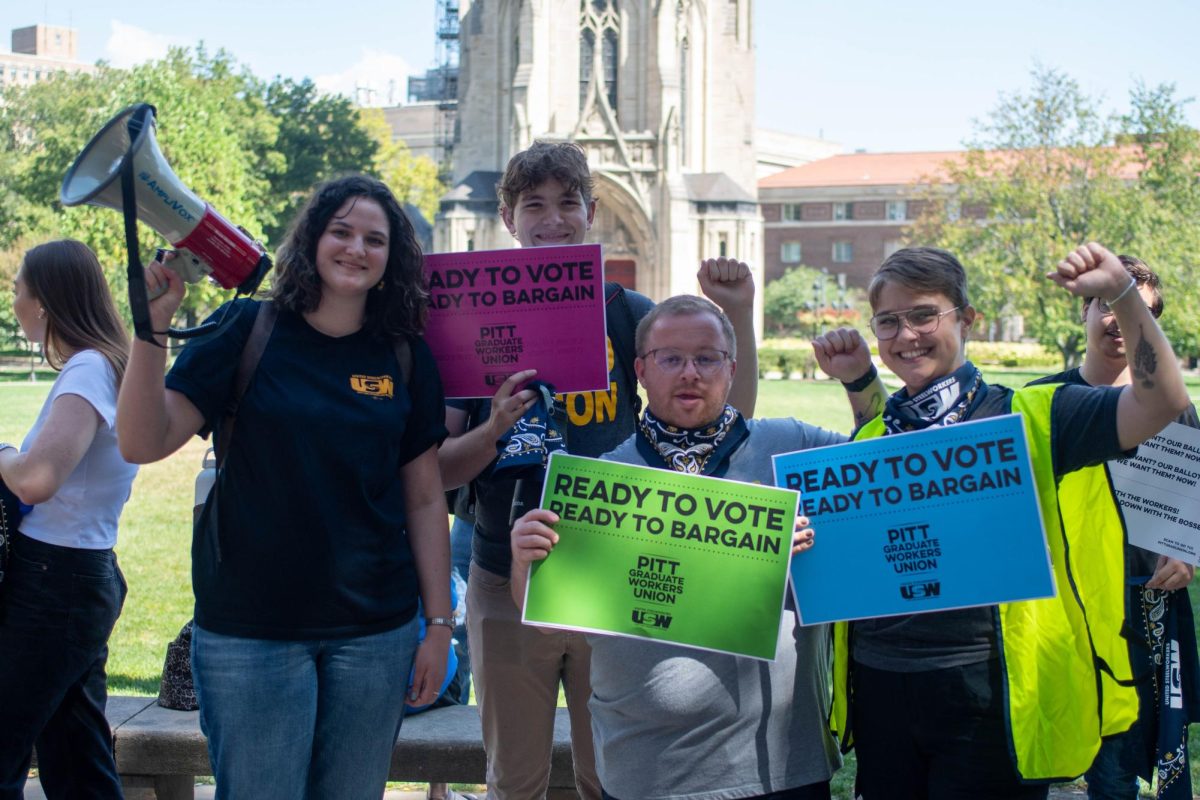After more than a year of negotiations, graduate students at the University of Pittsburgh will finally be able to hold an election to unionize.
On Nov. 18, 19 and 21, the Graduate Student Union will hold its unionization election. If the vote passes, the union will begin its collective bargaining agreement with the University of Pittsburgh with plans to focus on fighting for stronger health benefits and pay.
In the fall of the 2023-24 academic year, the university increased the out-of-pocket expenses for graduate workers’ health insurance, which “galvanized” the graduate student unionization effort, according to union organizer Alison Mahoney.
Mahoney, a doctoral candidate in theater and performance studies and member of the Graduate Student Organizing Committee, said the unionization effort has experienced several delays over the past few months that have prevented them from setting an election date until now. Mahoney said the union agreed on election dates several months ago — however, “Pitt’s lawyers and the Pitt administration said they couldn’t find any rooms in all of Pitt’s campus for us to have an election, which seems ridiculous.”
Mahoney described these months-long delays as a “standard union-busting playbook.”
“As far as we understand, these were intentional delay tactics to try and put off the election,” Mahoney said.
In response to a request for comment, Pitt media directed The Pitt News to the university’s FAQ and informational page.
Back in January of this year, the graduate students began to sign their authorization cards. In the state of Pennsylvania, 30% is needed to form a union. However, should a group reach 50% in authorization cards, they may ask to be voluntarily recognized by their employer.
Mahoney said “well over 50%” of eligible graduate students signed the authorization cards, which is considered a supermajority.
“We asked Joan Gabel to [voluntarily recognize our union] on Jan. 30,” Mahoney said. “She did not, and so we filed our supermajority of authorization cards with the state labor board on Jan. 31.”
After a clear expression of interest, Mahoney said the University must then provide the Pennsylvania Labor Relations Board with a list of employees eligible for unionization. “It took the administration over seven months to provide the state labor board with that list,” Mahoney said.
As a response, the graduate student union held a rally outside the Cathedral of Learning in September to protest the delays.
“The evening after we had that rally, Joan Gabel finally provided the list to the state Labor Board,” Mahoney said.
“We respect your democratic right to vote and to decide if you would like to be represented by the United Steelworkers,” the site states.
The Graduate Workers Union is one of many unionization efforts across the University of Pittsburgh campus. Earlier this month, workers from UPMC began a picket in an effort for better pay and hours. Earlier this year, alongside other universities nationwide, Pitt faculty and staff were able to ratify their first contract with the university.
There is a rise in the approval of unions all around the U.S. Prominently, SAG-AFTRA held a three-month strike in the summer of 2023, and recently U.S. port workers saw success in the short three-day strike they held early this month.
This rise has seen meteoric growth in higher education unionization efforts, with a 133% increase since 2012.
“There’s a real swell, I think, in the labor movement right now, specifically in the higher ed labor movement,” Mahoney said. “There’s all kinds of incredible stuff happening.”
Mahoney cited the “union town” culture in the city of Pittsburgh and the support they received from other local organizations. The United Steelworkers Union, a large national and historical union, is headquartered in Pittsburgh. USW will also represent the graduate student’s union at the national level.
Once we win our election, we will be local with the United Steelworkers, and they will be our international union,” Mahoney said, “[The] whole theory [that] we’re stronger together than we are individually, stands true for a national or international union.”
The election held in November will elect a bargaining committee that will begin to draft a contract and negotiate with the university.
“We’re excited to win our union, and we’re excited to bargain a really strong first contract, and it’s been many, many years coming,” Mahoney said. “We’re really excited.”



